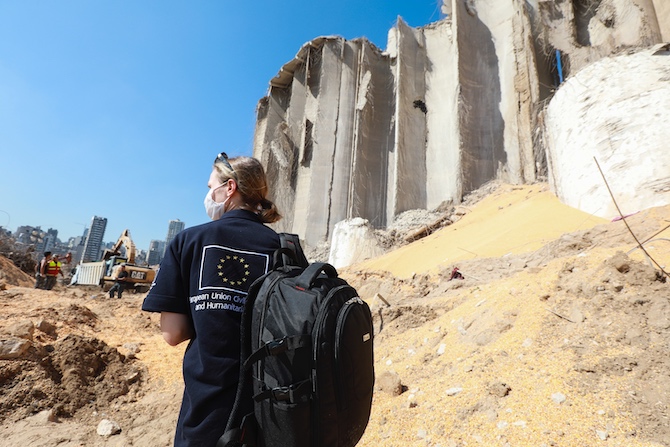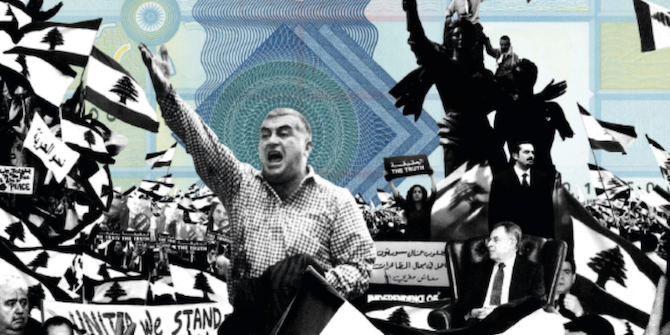by Alexi Touma and Youmna Cham

Nearly 7 months have passed since the 4 August port explosion devastated Beirut, unleashing immense destruction and causing significant loss of life. The blast came as Lebanon was immersed in compounded crises, from financial meltdown to hyperinflation and rising poverty, while the COVID-19 pandemic further strained the country’s healthcare system. The explosion added another grievous wound to an already paralysed Lebanon, and laid bare years of bad governance, rampant corruption and mismanagement.
Lebanon’s corrupt government received global opprobrium as a result, leading donors to bypass the state’s role in managing relief efforts by providing assistance directly to non-state actors such as civil society organisations (CSOs) and other humanitarian actors on the ground. While this proved fruitful in supporting immediate relief efforts, it remains unclear whether continuing to bypass state apparatus will do more harm than good for Lebanon’s future development.
A Failed State
Emergency aid following the port explosion flowed into Beirut, but instead of being disbursed through the government, most of the aid was channelled directly to local NGOs, multilateral organisations and other private contractors active on the ground. This dynamic has also been observed in Haiti, where 60 percent of aid bypassed the central government and went through non-state actors by fear of aid being captured by corrupt politicians.
The Lebanese government’s response following the blast was glaringly absent, failing to handle its responsibilities to citizens affected. While in other countries, the government would have implemented an emergency response plan, in the immediate aftermath of the port explosion various NGOs filled the gap left by the failed Lebanese state, and a parallel state structure has been create to handle aid delivery and other reconstruction assistance.
A Humanitarian Arena following the Beirut Blast
Lebanon following the blast was no silent emergency – the volume of emergency assistance was encouraged by the (at least initially) constant media coverage, often referred to as the ‘CNN effect’, as well as existing international interests in the MENA region, along with the network strength of local organisations.
The immediate plethora of volunteers and humanitarian initiatives quickly evolved into a more structured army of local NGOs that divided up and allotted affected areas to different groups, so that efforts could be managed more effectively. Most relief came in the form of medical assistance, food and water, shelter, psychosocial support, hygiene and sanitation, education, and reconstruction.
Major donor countries provided relief to Lebanon, while Western leaders made it clear that no aid would find its way to the ‘corrupt hands’ of the Lebanese ruling class. Australia, for instance, declared that assistance would go directly to the affected communities, via trusted agencies. The UAE and Turkey, among other non-traditional donors, followed suit, although without imposing strict conditionalities for reform like their OECD Development Assistance Committee (DAC) counterparts.
Lebanon’s long recovery following the blast cannot be addressed solely by aid agencies and local initiatives. Recovery efforts should come hand in hand with addressing deeper-rooted political misconduct and mismanagement, in order to improve the country’s long-term stability prospects. While bypassing state structures can indeed support short-term relief efforts, it can also act as a double-edged sword that hampers the state’s capacity to act and manage development.
Pitfalls: The Unintended Consequences of Bypassing State Structures
The appeal of bypassing state institutions in the delivery of aid as an alternative to support needy communities in the short-term has its own challenges. Numerous issues in the form of inter-NGO competition for funds and territories were evident in the aftermath of the blast, leaving affected communities dissatisfied with the inequitable distribution of NGO relief efforts. Lack of coordination among actors led to inadequate and duplicated needs assessments, further weakening the effectiveness of the aid distribution process.
Additionally, fiscal donations were directed to a limited number of organisations whose mandates addressed a narrow scope of needs, such as healthcare or food distribution, while under-resourcing others such as housing. Furthermore, an unintended consequence of hard currency donations could be the empowering of Lebanon’s currency black market, or donations could end up losing their monetary value (if they even reach recipients) due to the country’s fraudulent financial system.
This overreliance on non-state actors may also further weaken Lebanon’s domestic capacity to formulate development strategies, dilute its policy space and do little to improve its institutions. Needless to say, the creation of a dual public sector brings with it myriad other problems.
Addressing this complex reality where government mediated aid is unreliable, and foreign aid bypass tactics are unsustainable in the long run, donors should consider revisiting their aid strategy and move cautiously when deciding on future delivery tools and tactics, in order to make aid a catalyser for sustainable development. Building state capacity in Lebanon is certainly not an easy project, nor can it be expected to provide the much-needed immediate assistance to those affected by the blast. Developing an approach to address long-term ramifications of aid dynamics while addressing current needs will not only need a combined effort from donors, CSOs, and reform champions within the government, but coordination efforts at deeper levels amongst those actors themselves. Donors must maintain a rigid conditionality strategy and apply the macro level pressure needed to influence structural reforms. CSOs may provide an intimate understanding of the social and community impact of reforms – or lack thereof – while advocates of reform bridge the gap in understanding the intricate functions and dynamics of the state. This is just one potential approach that will help establish accountability along the way.






